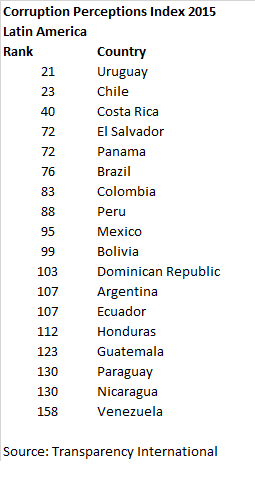My first advice to any exporter seeking to do business with Latin America, is to remember that each country in the region is different and that therefore each should be treated in a unique way. Few things set us apart more than the incidence, perception and tolerance of corruption.
Transparency International have released today their 2015 Corruption Perceptions Index*. This is how Latin American countries do (for reference, the UK ranks 10 and Japan 18):

So, just like playing against Suarez in terms of fairplay is not the same as playing against Forlan (both Uruguayans, by the way), doing business in Venezuela, Panama, Chile or, well, Uruguay, is really not the same. I’m not saying you should totally rule out doing business in the worst-rated countries, but you should be prepared.
First, you need to really work out if the country, taking into account corruption, is interesting enough for you as an exporter. You can’t base a decision on just this index, so part of your market research will involve digging into this issue further and eventually asking yourself: is the risk worth taking?
I’m assuming here that if you do go ahead, you won’t want to engage in corrupt practices (I don’t work with companies that are happy to do so), however, some preparation is still needed:
– Complete fluency in the local language (Spanish/Portuguese) and culture is a must if you’re dealing in corrupt countries/organisations/people. A lot is not said, or said very “quietly”, so you’ll miss out if you’re dealing only in English.
– Legal protection is a must when exporting to less transparent countries. Can you afford it?
– Risks are much higher when things are unwritten and when you’re likely to be put in a situation where you have to consider breaking, UK, local and international regulations. Are you prepared to take these risks?
– You will no doubt have to walk out from deals that will involve some “unclear” practice.
– Your international team including local partners have to be aligned. Does your distributor understand that you will not agree to any “payments”? Does your regional sales manager understand that they cannot “offer” anything “extra”? Will you punish them for lost contracts that they couldn’t have won without engaging in corrupt practices?
We hope the index gives you a first glance into the issue of corruption in Latin America. It shouldn’t paralyse your decisions, it should make them much more fact-based and long-term. And definitely a lot more country-specific. And that’s a good thing.
*I completely recommend visiting the Transparency International website to find out why corruption is such an issue, particularly in developing countries, and why paying a bribe is much more, in my opinion, that a business decision that affects just two parties.
